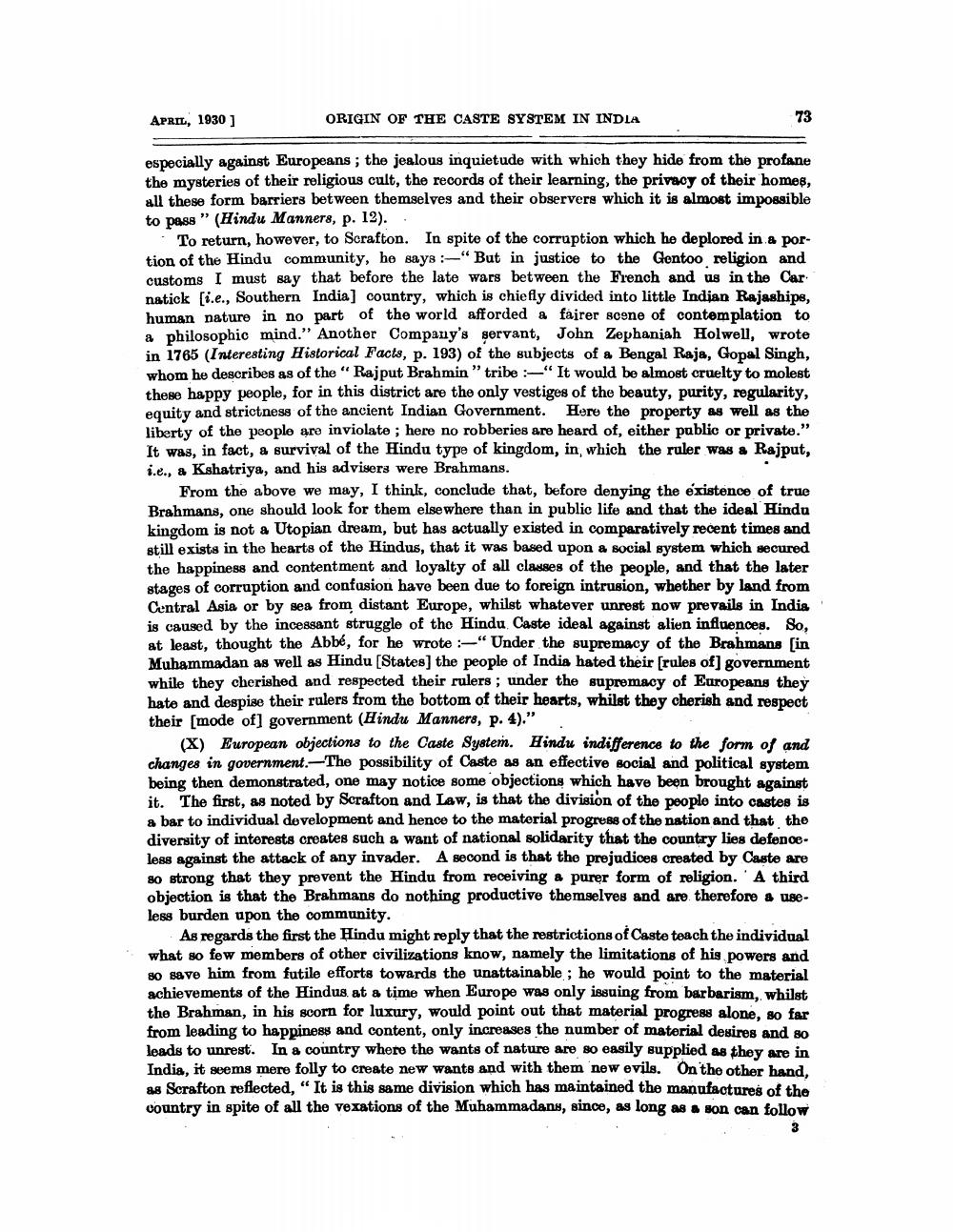________________
APRIL, 1930 ]
ORIGIN OF THE CASTE SYSTEM IN INDIA
73
especially against Europeans; the jealous inquietude with which they hide from the profane the mysteries of their religious cult, the records of their learning, the privacy of their homes, all these form barriers between themselves and their observers which it is almost impossible to pass" (Hindu Manners, p. 12)..
To return, however, to Scrafton. In spite of the corruption which he deplored in a portion of the Hindu community, he says :-“ But in justice to the Glontoo religion and customs I must say that before the late wars between the French and us in the Car natick i.e., Southern India] country, which is chiefly divided into little Indian Rajaships, human nature in no part of the world afforded a fairer scene of contemplation to a philosophic mind." Another Company's servant, John Zephaniah Holwell, wrote in 1765 (Interesting Historical Facts, p. 193) of the subjects of a Bengal Raja, Gopal Singh, whom he describes as of the "Rajput Brahmin "tribe " It would be almost cruelty to molest these happy people, for in this district are the only vestiges of the beauty, purity, regularity, equity and strictness of the ancient Indian Government. Here the property as well as the liberty of the people are inviolate ; here no robberies are heard of, either public or private." It was, in fact, a survival of the Hindu type of kingdom, in which the ruler was a Rajput, i.e., a Kshatriya, and his advisers were Brahmans.
From the above we may, I think, conclude that, before denying the existence of true Brahmans, one should look for them elsewhere than in public life and that the ideal Hindu kingdom is not a Utopian dream, but has actually existed in comparatively recent times and still exists in the hearts of the Hindus, that it was based upon a social system which secured the happiness and contentment and loyalty of all classes of the people, and that the later stages of corruption and confusion have been due to foreign intrusion, whether by land from Central Asia or by sea from distant Europe, whilst whatever unrest now prevails in India is caused by the incessant struggle of the Hindu Caste ideal against alien influences. So, at least, thought the Abbé, for he wrote "Under the supremacy of the Brahmans (in Muhammadan as well as Hindu [States) the people of India hated their [rules of] government while they cherished and respected their rulers ; under the supremacy of Europeans they hate and despise their rulers from the bottom of their hearts, whilst they cherish and respect their (mode of] government (Hindu Manners, p. 4)."
(X) European objections to the Caste System. Hindu indifference to the form of and changes in government. The possibility of Caste as an effective social and political system being then demonstrated, one may notice some objections which have been brought against it. The first, as noted by Scrafton and Law, is that the division of the people into castes is a bar to individual development and hence to the material progress of the nation and that the diversity of interests creates such a want of national solidarity that the country lies defenceless against the attack of any invader. A second is that the prejudices created by Caste are 80 strong that they prevent the Hindu from receiving a purer form of religion. A third objection is that the Brahmans do nothing productive themselves and are therefore & useless burden upon the community.
As regards the first the Hindu might reply that the restrictions of Caste teach the individual what so few members of other civilizations know, namely the limitations of his powers and 80 save him from futile efforts towards the unattainable ; he would point to the material achievements of the Hindus at a time when Europe was only issuing from barbarism, whilst the Brahman, in his scorn for luxury, would point out that material progress alone, so far from leading to happiness and content, only increases the number of material desires and so leads to unrest. In a country where the wants of nature are so easily supplied as they are in India, it seems mere folly to create new wants and with them new evils. On the other hand, 48 Scrafton reflected, “It is this same division which has maintained the manufactures of the country in spite of all the vexations of the Muhammadans, since, as long as a son can follow




